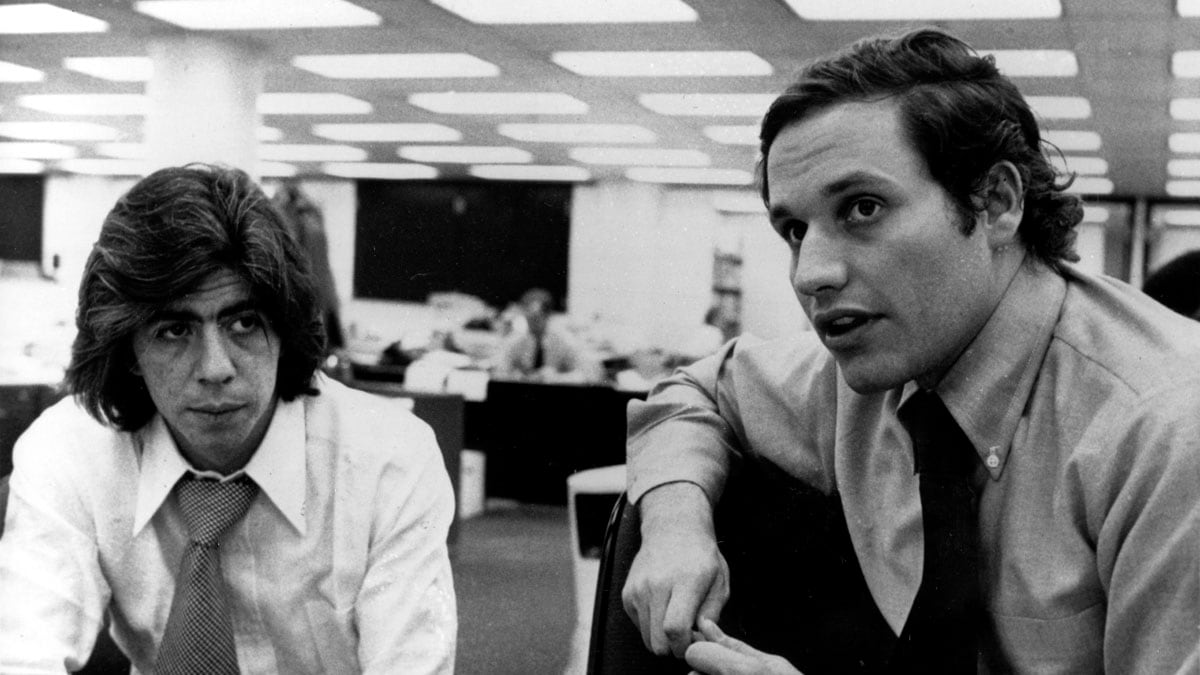For several decades following the 1974 publication of All the President’s Men, Carl Bernstein and Bob Woodward have had to fend off critics of their bestselling account. For the most part, they have succeeded wildly, sloughing them off as ill-informed skeptics, untrustworthy revisionists, and plain sore losers.
But now comes a criticism from perhaps the one person capable of putting All the President’s Men in its place by poking holes in the Deep Throat saga. That’s because the voice of dissent is Ben Bradlee, The Washington Post editor made equally famous by the book and eponymous movie.
In a 1990 interview conducted by Barbara Feinman, who was then helping Bradlee compile his memoirs, the Post’s executive editor during its fabled Watergate coverage volunteered the observation, “You know I have a little problem with Deep Throat.”
“Did that potted [plant] incident ever happen? ... and meeting in some garage. One meeting in the garage? Fifty meetings in the garage? I don’t know how many meetings in the garage ... There’s a residual fear in my soul that that isn’t quite straight.”
Nothing akin to this sentiment appeared in Bradlee’s memoir, A Good Life, when it was published in 1995. The “residual fear” remark was discarded (an “outtake, Woodward would later call it), and the only discordant note Bradlee sounded was that in retrospect, he was “amazed” that he had accepted Woodward’s desire to keep Deep Throat’s identity secret from him. “[Given the high stakes] I don’t see how I settled for that, and I would not settle for that now,” Bradlee wrote.

That Bradlee harbored such a radical thought—mind you, not about the Post’s actual coverage in 1972, but Woodstein’s 1974 account of it—is one of the major revelations in Jeff Himmelman’s about-to-be-published biography of the Post’s storied editor, Yours in Truth. An excerpt from the book, which appears in New York magazine’s May 7 issue, has evoked an angry rebuke from Woodward—not only because it “gives fodder to the fuckers” out there, which is how the Post’s superstar reporter refers to his critics—but because Himmelman, of all things, is a former Woodward researcher who became Boswell to Bradlee’s Johnson at Woodward’s suggestion.
Lest you, dear reader, think this is a manufactured controversy, a kerfuffle over some minor details—did Bob really move a flower pot on his balcony, and if so, how many times?—Woodward realizes what is at stake. Shortly after Himmelman read the Feinman transcript for the first time in April 2010, he interviewed Woodward. His mentor was "visibly shaken" after reading the passage, Himmelman writes, and “all vigor drained from his voice.” Himmelman then went back to Bradlee, who would be lobbied by Woodward to disavow the phrase "residual fear" or prohibit its use by Himmelman. Together, Himmelman and Bradlee tried to parse the reason for Woodward’s “off-the-charts” reaction. To Bradlee, it suggested that the notion of embellishments in All the President's Men "might be true."
There is reason for Woodward to be thin-skinned, because notwithstanding 15 mostly bestselling books to his credit, All the President’s Men remains the foundation for his (and Bernstein’s) renown. And it does have problems. It’s not because “some portion of the Deep Throat story really isn’t quite straight,” as Himmelman opined, when trying to understand why Woodward had become so unhinged by Bradlee’s near-aside. Rather, it’s because at the heart of All the President’s Men is a fairy tale, albeit a compelling one.
During that same 2010 interview with Himmelman, Bradlee said he was only trying to convey the idea that “to strengthen his case,” Woodward had “neaten[ed] things up a little” in All the President’s Men. Bradlee doesn’t realize the half of it. In addition to woefully mischaracterizing the most famous secret source in history (more about that later), Woodward committed acts of embellishment that any normal reporter would be drawn and quartered for. I compared Woodward's contemporaneous typewritten notes of his conversations with W. Mark Felt, the FBI's No. 2 man at the time of the Watergate break-in, with the book account of those meetings; the differences are striking. (the notes are publicly available at the University of Texas's Harry Ransom Center). Phrases that are not enclosed in quotation marks in the notes are presented within quotation marks in All the President’s Men, lending the impression that Felt spoke those exact words. Sentences are moved around and the progression of Felt’s remarks rearranged. Occasionally, the meaning of what Felt said is substantially changed. Finally, the account in All the President’s Men contains direct quotes of words, phrases, and sometimes whole sentences that are not present in the contemporaneous typewritten notes.
While writing Leak: Why Mark Felt Became Deep Throat last year, I asked Woodward about these discrepancies. He replied that when writing All the President’s Men, “I may have had a distinct recollection that something was in quotes ... and so I may have put quotes in it.” Re the passages in the book that do not appear in the typewritten notes at all, he responded, “It’s just like when you testify under oath in a courtroom. You may have some notes, and you may say, ‘the notes say this, but I recall that in addition.’”
All the President's Men was for a long time controversial internally at the Post, if only because it reduced the contributions of two key editors: Barry Sussman, who was every bit as central a figure as Bernstein and Wooward in the Post’s actual coverage, and Howard Simons, who insisted on a dedicated investigation well before Bradlee got into the picture. It was the newspaper as a whole after all, that won a 1973 Pulitzer for its Watergate coverage, not the reporting duo. The movie, of course, simply made matters measurably worse, airbrushing Sussman out of existence and reducing Simons to a hand-wringing fussbudget.
Even more disconcerting is the disservice that All the President’s Men has done to the historical record. The book (and not the contemporaneous Post articles, because they cannot remotely claim to do the job) remains the basis for Woodstein’s assertion that they cracked Watergate with the assistance of the “truth teller” named Felt. Yet Deep Throat, far from being principled, was consumed with ambition and leaked only for the most self-serving of reasons: to subvert the acting FBI director, L. Patrick Gray. Nor was Felt even a truth teller. His boundless contempt for the press—and even Woodward admits Felt was no fan of the fourth estate—is illustrated repeatedly by the numerous outright lies and half-truths he told Woodward in the year following the break-in, and simultaneously, the damaging facts he knew but consciously withheld from the cub reporter.
Apart from transforming Mark Felt into an undeserving hero, Woodward and Bernstein, via their account, have distorted the true history of how the Watergate scandal unfolded and who deserves the credit for cracking it. To believe Woodstein is to believe that the original federal prosecutors “missed the real story” when the truth is these same U.S. attorneys handed the Watergate special prosecutor a literal road map to every single successful prosecution of a higher-up.
Yesterday Bradlee released a statement through his wife, the journalist Sally Quinn, that attempted to walk back his 1990 quote, or what Michael Kinsley would define as a gaffe. "There was nothing specific that Ben had doubts about," Quinn said. "Everything that Bob and Carl Bernstein reported was absolutely the truth. The story stands up. No one is questioning Bob's veracity. He did an incredible job of reporting. Nixon resigned. I think Bob is the greatest reporter in the history of journalism. This doesn't change the legacy of Watergate or Ben or Bob or Carl."
The problem here is that Woodward and Bernstein don’t remember that journalism, as the cliché goes, is only the first rough draft of history.
They are insisting that their first draft is, and must be, the last word.





